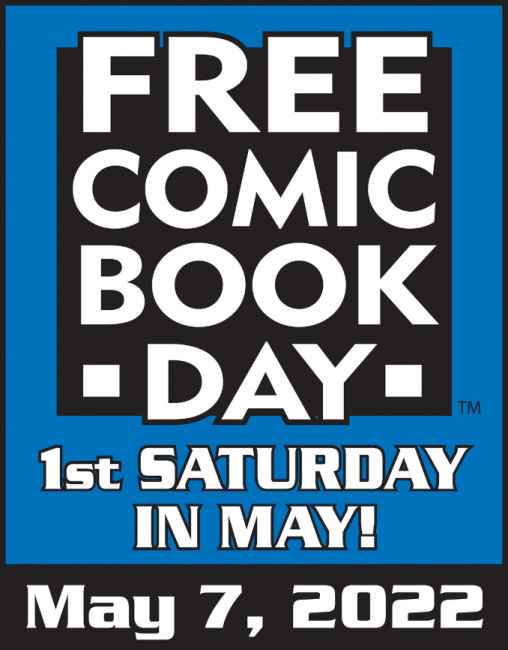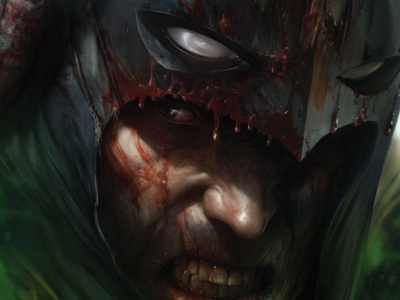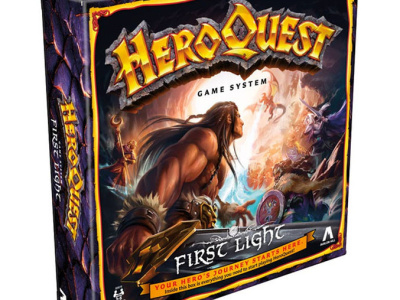After our conversation with CBLDF Interim Director Jeff Trexler on the overall situation on comics and graphic novels for kids (see "Trexler on the Growing Attacks on Graphic Novels for Kids"), he shared a warning on the dangers of Free Comic Book Day and the new comics code.
ICv2: What are your thoughts on the biggest risks right now?
Jeff Trexler: There’s something that retailers really need to be careful about, and it's Free Comic Book Day.
Free Comic Book Day gets attention in the community. Free Comic Book Day is something that gets in news stories. The sort of people who could criticize you might not even know there’s a comic store in the neighborhood, and all of a sudden, they see it on the news, or on Free Comic Book Day they see people lining up, or their kids go to Free Comic Book Day and they come back with books.
One thing that's changed in Free Comic Book Day in recent years was the recommended age range for the book switched from a text‑based statement on the cover to a color code. If it's for mature readers, it’s one color, and for young readers, it’s another color. But not every retailer recognized the color change. It was a classic usability problem because what you had was a rubric that's designed to help retailers make certain decisions, but then retailers were used to one thing but not everybody read about the changes.
[Note: A Diamond Comic Distributors spokesperson told us that the decision to go to a color code was made by Diamond "in partnership with the FCBD advisory committee." Green is all ages, blue is 13+, and red is 18+, ed.]
If it doesn't say adults only, or 13 and up, or whatever, it's not that helpful.
It's not. You add that to another design issue, which is that for indie comics or younger comics, you know how the styles of comics have changed. There's a number of comics today, the drawing style is, you can say, very youth-oriented. Not everybody's drawing the realism, say, of Neal Adams or of Joe Kubert.
The art style does not tell the age group anymore.
The art style does not tell the age group is the way to put it, exactly. Their art style is not for the age group.
What you have is books out there that may have a certain cartoony style that if you aren't familiar with it, you don't know that it could be an indie comic that's talking about sexuality or dating relationships or going on Tinder or something like that. So if you don't have a disclosure on the cover, those books can get out into the stream in terms of a table for books to be given to kids.
[Note: this was an issue that contributed to an incident involving a library during last year’s Free Comic Book Day, see "Library Apologizes After Child Gets Adult Comic on FCBD." Ed.]
One of the Fund’s most famous cases was in Rome, Georgia during a Halloween promotion. The retailer was giving away comics. He gave away a comic with a nude image in it to a kid and got arrested (see "CBLDF Takes Georgia Obscenity Case").
That's happening again. Luckily, we've been able to keep those from going to prosecution so far, but it's happening again. The pressure is real because when you're a retailer and you have a flood of books coming in, you've more people writing indie press books, and you have people doing mainstream books, what's the decision you're going to make?
You don't have a lot of time and the risk is huge. Are you going to make sure that you read every single comic that comes across your table? You don't have time to do that. Nobody has time to do that.
There's so many points of failure on this in a store: beyond ordering, when comics come in, they have to be put on a shelf. Are you trying to segregate the ages on a shelf? Who's the person that's unpacking the boxes? Do they know these color codes? Do they know how to sort this stuff? And maybe they have extra employees brought in for Free Comic Book Day and they're standing next to the rack going, "These are for kids," or, "These for adults." Do they know what's going on? There's a huge training issue for retailers. They may have every employee on deck for Free Comic Book Day, and not everyone is equally trained. It's a very difficult situation for them.
Twenty years ago, we were talking about the earlier case, you have a situation where that sort of thing could happen and maybe a book gets out in Free Comic Book Day. A common situation that you had back then was you had people going undercover, much like they would do for cigarettes. For underage purchases of cigarettes, they'd send people undercover.
Years ago, when CBLDF was founded in 1986, you're dealing with that was an adult, but then they started sending kids or people who look like kids. Now you have every person who sees this as an issue, sees this as something where they could get attention on Twitter or Instagram or TikTok, and they could go viral and they could get a reward.
Add on to that, you have a situation where this is seen as a wedge issue. I mentioned the parent in Virginia who went viral after talking about this. Then, that became the heart of the Youngkin campaign. One could say that the protest of Gender Queer became the hub or the foundation of a movement that ended up getting the Republican Governor of Virginia elected.
That is now being seen by electoral strategists nationwide as a key factor in the shift demographically why the Democrats are losing a lot of Hispanic votes, why the Democrats are losing a lot of certain ages within the Black vote. They're seeing it as a response to the sexual imagery in the books and that sort of thing. That's what the polling is telling them, anyway. That's what they're seeing based on Virginia.
So there are now people who are looking to create these controversies nationwide, particularly where there's a district where somebody might be able to overcome certain historic disadvantages in terms of voting.
They can use this in order to get some other people on your side or at least discourage them from voting. Now, you're not so much worried about necessarily the person who happens to get a copy, or their kid happens to get a copy, or there's somebody going in undercover from the DA's office or from the police.
Now you have to deal with the fact that anybody who feels like they want to be the hero of the story, or they want to change the electoral fortunes in their district, anybody coming in could be someone who gets this material and then posts it online.
And they have a recording device in their pockets.
They have recording device in their pockets; they have a camera in their pockets. This is another thing I've heard from retailers in certain areas where there's sensitivity: I've heard from certain retailers in certain Midwestern states, where they have people come by their shop, whether by the window or in the shop, and they don't buy anything, but they're taking photographs.
One of the first stories we did on our site, was (looking at it, February 22, 2001) avoid hidden cameras in your store. It was the same thing. The cameras were much bigger then, but they were trying to video the clerk selling comics that were intended for adults to children. This has been going on for a long time, but it's definitely a lot hotter now. It's easier because your phone is in your pocket.
This is part of the reason why I'm thinking a lot about social media and sort of the new comics code. The new comic's code is an algorithm. We talked about that before (see "Trexler on eBay’s New Rules"). What people are trying to do is not simply the fact that they're trying to get retailers arrested or school teachers arrested or librarians arrested.
They recognize in the age of Twitter, you don't have to do that. All you have to do is get them shamed or banned. You can mass swarm a retailer and report them to Facebook or Twitter for selling pornography.
I can tell you, as somebody who's tried to help people with these situations, it's relatively easy to swarm a retailer or a creator or somebody online and get them banned by the algorithm because there's a certain critical mass that reports that this person is doing something pornographic.
You go on to Facebook to see how easy it is to report somebody for selling sexually inappropriate material or just even posting it. It's a lot harder to get them restored because the appeals process, much of it, is not done by humans. It's just layer upon layer upon layer upon layer of bot, bot, bot.
Even the lawyers that you interact with (this is somebody who's interacted with lawyers on this) just tend to press a button and return a canned response about the terms and conditions on the site, not even bothering to look at the specifics. It's much, much harder to get somebody reinstated than it is to get them banned.
Again, you're talking about an expensive process. With comics and in certain other industries, you're not exactly dealing with huge margins here.
It's something where if your online sales are out for a few months, that could be an existential crisis. Yet getting your site restored on Twitter or Facebook or Shopify or Vimeo or Amazon could be this huge process. It's a very difficult process where even a really good attorney or a manager or a strategic advisor is going to have to try to fight through layers of things that are nothing more than a mathematical formula that has been arrayed to make sure you don't get through them because these large companies, ideally what they're trying to do is minimize risk.
They don't want legal exposure for child pornography. They don't want to lose reputation by having been described as sites that sell pornographic material. They don't want to be banned from certain countries for selling material about same‑sex relationships or trans‑identity or something like that. So the inertia is to err on the side of banning them than on inclusion. That's where the future fight is going to be. There's a present element to it as well, but that's where the future fight is going to be.
Click here for more ICv2 Kids Week articles on kids comics and graphic novels!

And the New Comics Code
Posted by Milton Griepp on April 29, 2022 @ 3:19 am CT
MORE COMICS
From Dynamite Entertainment
August 8, 2025
Here's a preview of Space Ghost #1, published by Dynamite Entertainment.
Dark, Erotic Manga Based on Short Story by Edogawa Rampo
August 8, 2025
Maruo brings his signature “erotic grotesque” style to a dark tale by writer Edogawa Rampo.
MORE NEWS
Thursday July 31, 2025; 'D&D,' 'Riftbound,' and More!
August 8, 2025
The story of Gen Con 2024, as told through ICv2's staff photos, began on the morning of Thursday July 31, 2025 on the convention hall floor.
New Expansion Set for the Classic Fantasy Board Game
August 8, 2025
Hasbro will release HeroQuest: First Light, a new expansion for the classic fantasy board game, into retail.









